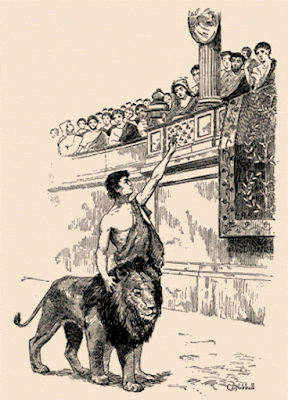The numbers
refer to notes after the text.
In numerō amīcōrum meōrum sunt
duo puerī. Mārcus, puer quattuordecim annōrum, [1] mihi praecipuus amīcus est.
Prope Dubrās nunc habitant, sed ex Calēdoniā oriundī sunt. [1] Nōbīs puerīs
fēriae nunc sunt; nam condiscipulī sumus. [2] Inter fēriās līberī sumus
scholīs. Amīcī meī mē saepe vīsitant, et ego amīcōs meōs vīsitō. Magna est
inter nōs amīcitia. Ūnā ambulāmus, ūnā in undīs [5] spūmiferīs natāmus,
cum nōn nimis asperae sunt. [3] Quantopere nōs puerōs lūdī pilārum in arēnā dēlectant!
[4] Ut iuvat castella contrā undās spūmiferās aedificāre!
[1] Note the
uses of the dative in these sentences:
Marcus ... mihi praecipuus amicus est.
│Marcus is ... a special friend to me.
Nōbīs puerīs fēriae nunc sunt. │ We
boys now have holidays [= are on holiday]; literally: to us boys are
now holidays.
[2] Inter
fēriās līberī sumus scholīs. This is an example of the ablative of separation
used without a preposition; it implies that a person or thing is separated
from something else, but not in a literal / physical sense:
Inter fēriās līberī sumus scholīs. │
During the holidays we are free from lessons.
An example of this was in an earlier text:
Nunc mīlitiā vacat. │ Now he is free
(retired) from the military.
[3] Quantopere nōs puerōs lūdī pilārum in
arēnā dēlectant! A more natural way of translating this sentence would
be: How much we boys love / We boys really love ball games on the sand! Note,
however, how Latin expresses the idea:
quantopere: how greatly
[i] lūdī pilārum ¦ in arēnā: ball games ¦ on
the sand
[ii] dēlectant: delight
[iii] nōs puerōs: us boys
i.e. lūdī is the subject of the sentence: games,
and those games delight (dēlectant) the boys (puerōs: accusative plural).
How greatly ¦ ball games on the sand ¦ delight ¦
us boys.
[4] Ut
iuvat castella contrā undās spūmiferās aedificāre! Iuvat is the 3rd person
singular of iuvō, -āre [1] (help) but, like dēlectat, it can be
used as an impersonal verb meaning ‘delight’ or ‘please’:
Ut iuvat castella contrā undās spūmiferās
aedificāre! │ Literally: How it
pleases to build castles against the foaming waves! [= How much fun it is
to ...]
[5] spūmifer,
-a, -um: foam-bearing; foaming
The suffix -fer
(bearing; carrying; bringing) is used in a number of words in Latin. Below are
some examples:
- frūgifer,
-a, -um: bearing fruit i.e. fruitful
- morbifer, -a,
-um: bringing disease
- mortifer, -a,
-um: bringing death i.e. deadly; fatal
- pācifer, -a,
-um: peace bringing i.e. peaceful
- pestifer, -a,
-um: bringing disease i.e. destructive
- aquilifer, -ī
[2/m]: standard-bearer i.e. the one who carries the eagle
- signifer, -ī
[2/m]: standard-bearer
- Lūcifer, -ī [2/m]: bringing light from Gk. φῶς (phôs, “light”) + -φόρος (-phóros, “bringing”) i.e. the
morning star; (Bibl.) Lucifer
Illustration of Lucifer in the first fully illustrated print edition of Dante's Divine Comedy. Woodcut for Inferno, canto 34. Petrus de Plasiis, Venice, 1491.







